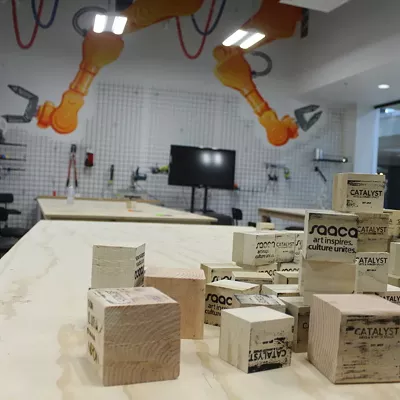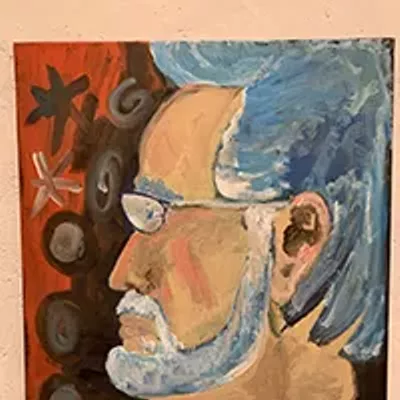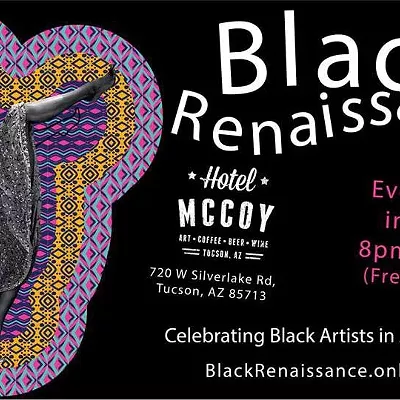This was a simpler time, even before sexy saxophones and pumpin' pianos and far in advance of today's amped-up, bleed-through-the-ears heavy metal or the pounding beat of do-yo-ho gangsta rap.
These were the days when groups like the Drifters, Platters, Coasters, Flamingos and a zillion others of that ilk harmonized memorable musical phrases such as "chu bah chu bah" and "oop shoop." Darned if the words didn't make sense then, and continue to bring comfort and memories now.
Still like that old time rock and roll
That kind of music just soothes my soul
I reminisce about the days of old
With that old time rock and roll
"LIFE WAS MORE BASIC in the 1950s and '60s, and four-part harmony telling love stories is about as basic as you can get," says Tucson resident Mel Rivers, former bass voice of the Drifters. Rivers, who shared the stage with a long list of musical greats such as Tina Turner, started his singing career on the street corners of Brooklyn. "There was a group in every hallway, down every subway station and on every stoop. I liked the competitiveness, the spiritual uplifting and the fact that we could earn spending money harmonizing."
Another Tucson musician, Sam Taylor, brought his Alabama gospel roots to New York just in time to be a player in the emerging industry. "I knew harmony since I was four years old," says Taylor, now 66. "We didn't have no piano, no guitar, no organ or microphone in our church, just the a cappella voices of gospel singers." The singer-songwriter-session guitarist remembers performances on the stage and on subway platforms that helped introduce black music to the white world.
"A lot of folks never got an opportunity for a show-and-tell field trip into a black congregation, so this was their first introduction to finger-poppin' rhythm," says Jeff Haskell, longtime stage performer and University of Arizona music professor. "This music is infinitely singable. It's mnemonic, easily remembered with hooks like simple cord changes, which made it more appealing to the younger crowd and folks less musically sophisticated."
Rivers, who drifted with the Rock and Roll Hall of Fame Drifters group for seven years, sings his answer when asked why the music is so enduringly popular. "It's poetic--boom--wop--why do fools fall in love? It was catchy--hmmm--whispering bells, love me so. It was about love and caring and romance. You told a story by creating a mental picture through words and music."
This was music you could sing along with, dance to, understand and relate to, says Ron Neuman, flashing a smile as brilliant as the 36 diamonds in his ring, a memento from his days as a member of the Diamonds. His group, popular in the mid-to-late '50s, was known for hits such as "Little Darlin'" and "The Stroll" (the two songs sold more than 8 million records). "I'll always be a doo-wopper who likes to return to that age of innocence where you could actually understand the words of a song," he says. "Entertainment back then was enjoyable," says Neuman, who has shared stages with Little Anthony and the Imperials, the Platters, the Coasters and a host of other well-known performers.
Don't want to listen to a tango,
Just wanna hear some blues or funky old soul
There's only one sure way to get me to go,
Start playing old time rock and roll
DISK JOCKEYS SUCH AS the author (in the '50s); Frank Kalil (in the '60s); Ed Alexander ('70s) and Alan Michaels ('80s) helped make and perpetuate the musical history. As a teenage DJ for a daytime 1,000-watt station back east in 1957, I listened under my pillow at night to the newly emerging sounds spun by Alan Freed at WINS radio in New York. Then I drove my station management--and my parents--crazy by playing the Olympics ("Western Movies"), the Oreos ("Crying in the Chapel") and numerous iterations of Little Richard at full volume. Constantly.
"We helped create a doo-wop culture by selecting a song as the "Pick Hit of the Week" and playing it once per hour, every day, for a week," says Frank Kalil, afternoon drive-time DJ for Tucson's KTKT in the mid-'60s. "There was less fractionalization of listener attention and we got most of what was available. It was gut hunch and blind luck, with perhaps a dose of divine guidance, but we were instrumental in making a lot of the songs and performers successful."
Ed Alexander, fresh out of Rincon High School, entered the business in 1970. "We'd bring our own music from home and play just about whatever we wanted to. It was all intuition and feel back then. We did what we thought was right, and if we liked a song, we played it, over and over again, to see if it got listener reaction. I can remember playing some titles as original releases, new music, and I'm still playing a number of those same songs--30 years later--as classic golden oldies."
Morning radio host Alan Michaels has been playing many of the same tunes for more than 20 years. "This stuff is timeless," he says. "This is raw harmony where groups rise or fall on talent alone, and there's no background blare to muffle their musical talent. You can feel the music of the doo-wop era; there's passion involved in the lyrics and layering of voices. We cared about people back then in times that were simpler and softer. That's why it was enjoyable then and is still popular today."
Call me a relic call me what you will,
Say I'm old fashioned say I'm over the hill
Today's music ain't got the same soul,
I like that old time rock and roll
SAM TAYLOR, A songwriter, guitarist, vocalist, recording artist and band leader who is well known to his Tucson audiences, has been involved in the genre for more than 50 years. He's proud of the 136 tunes he's written for the Rolling Stones, Beach Boys, Elvis Presley, Jackie Wilson, Jay and the Americans and others. He's also proud of the joy he's brought to audiences while performing with the likes of Otis Redding, the Isley Brothers, the Rascals and Sam and Dave.
"I was in the middle of it right from the start," Taylor admits, telling about a European tour with Joey Dee and the Starlighters where they shared stages with the Beatles prior to their introduction to American audiences. "They, the Beatles, opened for us, and we toured England for a couple of months with Paul and John always asking me about the music of BB King and Bo Diddley. Six months later they did the Ed Sullivan Show and a new era was born."
Despite two open-heart bypass surgeries, "I still bust a pretty good sweat," he says. "I'm playing better and singing stronger now than I ever have in my life. I love what I do. I live for the music and can't wait to play. You can't beat the natural high of performing for an appreciative audience. I live to play and play to live."
If you believe in forever
Then life is just a one-night stand.
If there's a rock and roll heaven
Well you know they've got a hell of a band.
--The Righteous Brothers
SOME PERFORMERS CAN'T stand it when the Klieg lights are dimmed and the microphones disappear. When the roar of the crowd is gone, they are lost--and want to return. Some do reappear, like Neuman and Rivers, who are now involved with a local group, American Thunder. In addition to the two former top bills, the band includes other heavy-hitters who once played with Marty Robbins and Glen Campbell and a writer who used to pen lyrics for the Oak Ridge Boys.
"Music is something that stays with you for life. Once you've been in the industry and made a living from it and enjoyed being at the top with a well-known group, it's hard to walk away completely," says Neuman. "It goes beyond missing the trappings, the standard 'smell of the greasepaint, roar of the crowd' thing. When there's music inside you, you have to express it and let it out for others to enjoy."
Neuman's American Thunder group plays a combination of both old and new music, including gospel, country and classics that call for traditional four-part harmony. "What a way to retire," says his singing partner, Rivers. "To leave one place and time and years later to show back up on another stage still doing something you love."










